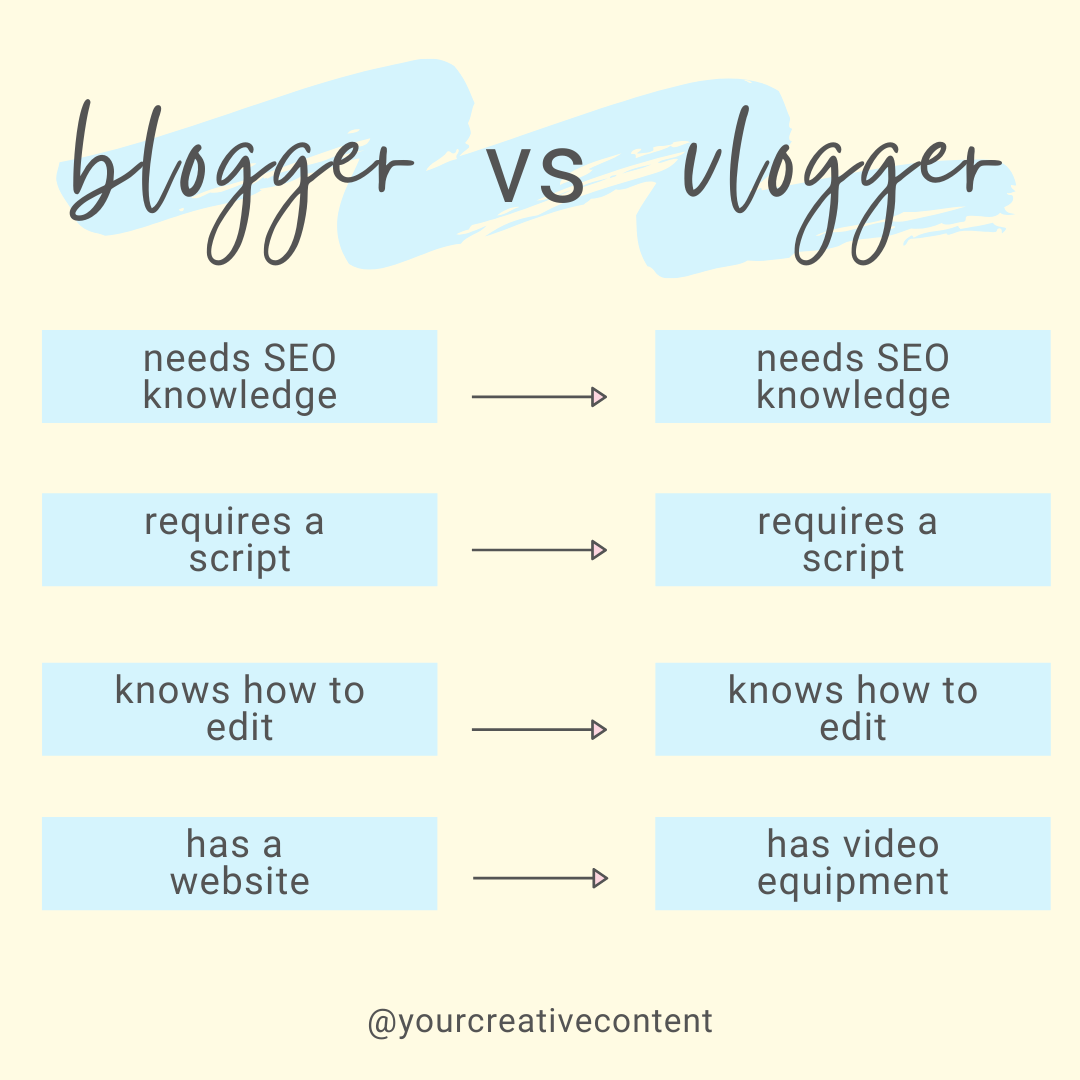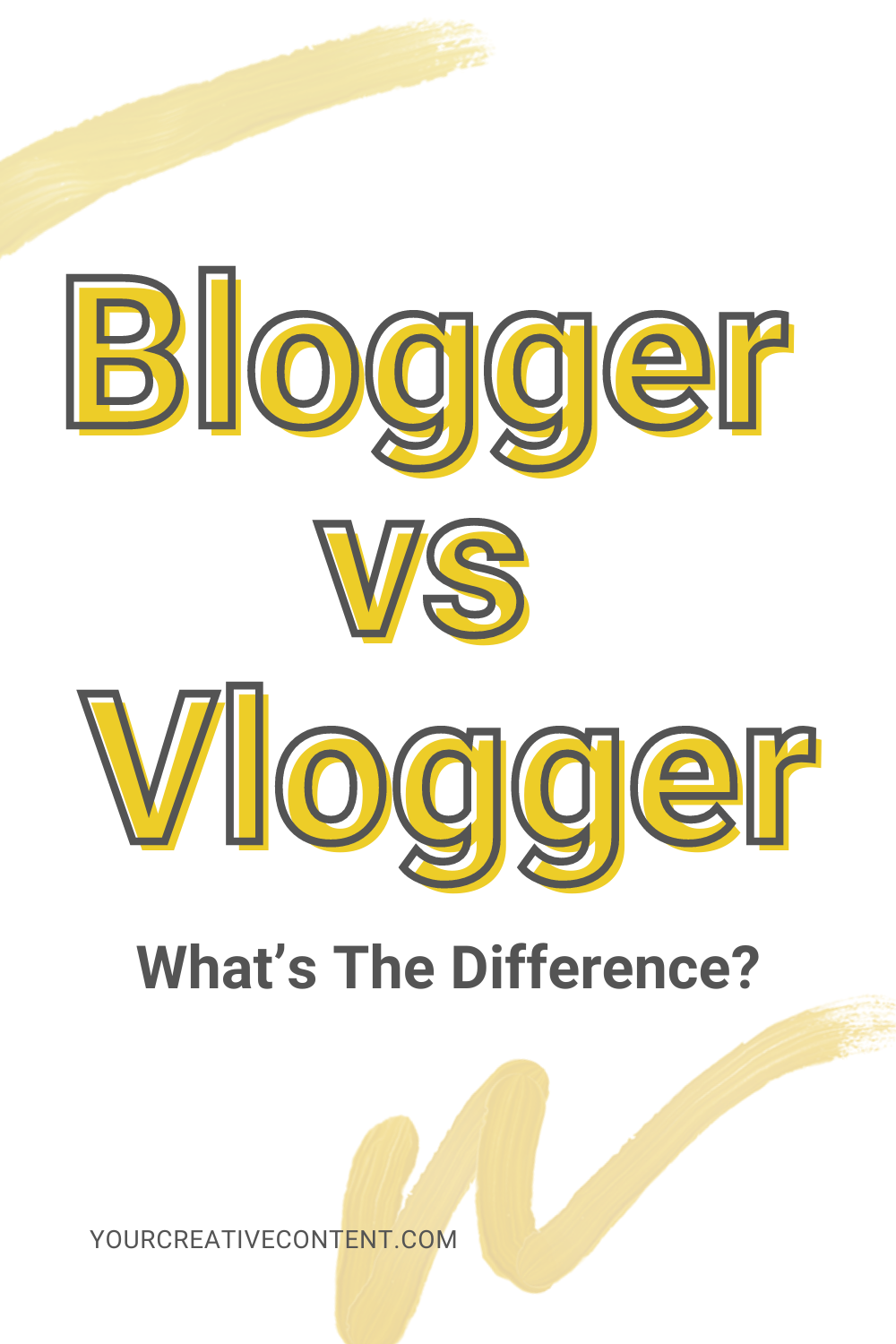Blogger vs Vlogger: What’s The Difference?
When it comes down to building your virtual following, you may wonder what are the true benefits of being a blogger vs. vlogger?
Honestly, there are soooo many benefits to both!
If you’ve been on the internet in the last decade, you’ll have noticed a huge growth in the vlogging trend. People from all walks of life have burst onto the popular culture scene – sometimes overnight – with captivating videos they published online.
Blogging has been around for a hot minute, but it’s still super relevant to scoring increased web traffic and potential clients.
So, what’s the difference here? Do you really need to pick up vlogging if you already have a blog or vice versa?
Vlogging might seem intimidating to someone who prefers wordsmithing, and blogging might seem like a lot of work to someone who loves being in front of the camera.
The trick to excelling at your virtual presence is to incorporate both into your published content. But I won’t sugar coat it – doing both regularly can be a real task.
Keep reading to decide for yourself if the benefits of mastering blogging or vlogging are worth the extra efforts.
Psst… They totally are.
RELATED LINK: Debunking the Myths of Being a Blogger
Blogger vs Vlogger: Is there really a difference?
A blogger is someone who writes long-form copy that shares information, thoughts, or experiences on a certain topic (or niche). Bloggers publish their work via their own website (also known as a “blog”).
One of my personal favorite bloggers is Pat Flynn of SmartPassiveIncome.com. Pat has become a successful small business owner after losing his prestigious job and investing himself in blogging. He’s the epitome of inspiration in my book!
A vlogger shares the same sort of content but in the form of short videos to maintain a video log or “vlog.”
A popular cooking vlogger, and one of my favorites, is Alyssia Sheikh of Mind Over Munch. Alyssia focuses on helping her viewers achieve a healthy lifestyle in a fun and transparent way. Her quirky charm makes her audience feel like they’re talking with their health-conscious bestie.
Just imagine… You could be the next self-made entrepreneur like Pat or Alyssia.
Go big or go home, right?!
The 5 Key Differences
To put it simply here’s the main difference between the two: a blogger writes and a vlogger films. As you can see, there isn’t much difference between a blogger and a vlogger. Both need to know how to use SEO, both work off of a script or outline, and both require editing. The thing separating a blogger vs a vlogger is that one has their own website and the other invest in video equipment.
Yes, a vlogger can also build their own website platform just like a blogger can run a blog and a YouTube channel (in fact, I encourage it). While social media is a powerful tool for every small business, it can’t be your only platform for sharing content. Starting a blog or vlog will give your online presence more authority and your audience more of what they want!
Everybody wins around here.
But while there are some similarities, there are also a few big differences in being a blogger vs. vlogger. Let’s take a look so you can decide which one to jump into first.
RELATED: 5 Steps For A Successful Influencer Blog
1. The Editing
Vlogging requires a certain amount of tech knowledge in order to produce and edit quality videos for your audience. Editing on video platforms like Tik Tok is slightly less complicated and can all be done in-app. But if you’re looking to start a YouTube channel, you need to consider which video software program and tools you want to buy.
There are a number of video editing tools out there. If you’re using an Apple Mac computer, you can download iMovie for free. Programs like Final Cut and Adobe Premiere are high-end software with more bells and whistles, but they come with a price tag.
YouTube is a fun, accessible way for your audience to follow your videos. However, you’ll find that successfully publishing on YouTube can be a bit technical. There’s the lighting, the audio (oh man, the audio), the editing process, graphics, and cutting out all those um’s. Canva has made it a little bit easier to make graphics, but when it comes to vlog editing, it just takes a lot of practice and a lot of patience.
When it comes to editing as a blogger, you’ll mostly just be proofreading your work and sometimes rewriting your content when necessary.
There’s no shame in my grammar game, but if *you’re not a grammar nerd like me, digital tools like Grammarly makes editing waaaay easier.
RELATED LINK: Do You Even YouTube? A Guide for Small Businesses
2. The Script
Most of a vlogger’s work is in the editing process. Luckily, aside from a simple breakdown with a few talking points, vlogs don’t typically require a script (it’s more of an outline).
What you may need though is some B-roll footage. B-roll footage is additional video footage you can include in your final edited video to help enhance the story you’re telling. This can be extra video footage, still photos, graphics or animations. So get creative!
Blogs, on the other hand, need a bit more planning in order to be successful.
Most of the heavy lifting for bloggers is in the initial writing and researching that goes into a blog post. According to Search Engine Journal, “The average Google first page result contains 1,890 words”. Depending on the topics, that long of a blog post can take even expert bloggers at least 2 hours to write, research, and format. That’s not including proofreading, editing, SEO research, and social sharing. However, having a thoughtful outline can help make hitting that word count a breeze.
PRO-TIP: Use your blog outline for your YouTube video talking points or use your YouTube talking points to craft out a detailed blog. Repurpose that content babyyyy!
3. Blogger vs. Vlogger SEO
In terms of SEO, it’s a level playing field between blogging and vlogging.
To reach Google’s first page, both blogs and vlogs need to have SEO strategies incorporated throughout their content.
To reach maximum SEO potential, blogs need to be written in long-form, meaning they are at least 1,000 words each. Long-form blogs allow for more in-depth writing which attracts more viewers and shares to bump up your standing with search engines.
A blog’s SEO is integrated into its titles, meta description, images, and H2 headings. Your keywords should be added into the body of text at least three times, as well. You can use free tools like Ubersuggest to determine which keywords your blog can rank for. And you can join memberships like The Blogger’s Journal to stay consistent with your SEO blogging content. ;)
A vlog’s SEO goes into its titles, description, and thumbnail image. Just like a blog needs SEO keywords in its first sentence or paragraph, keywords actually need to be said in the first few minutes of a video.
The payoffs of a blogger vs. vlogger are entirely dependent on how much you put into creating content. No matter what you do with your online presence, give it your all and I promise you’ll be happy you did!
Is blogging right for you? Here are 4 Reasons You Don't Need a Blog.
Pin it!




